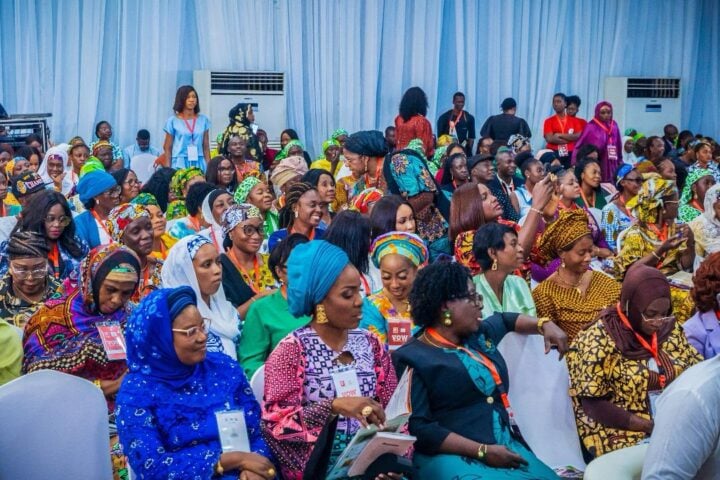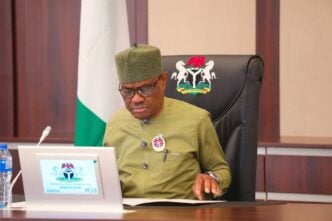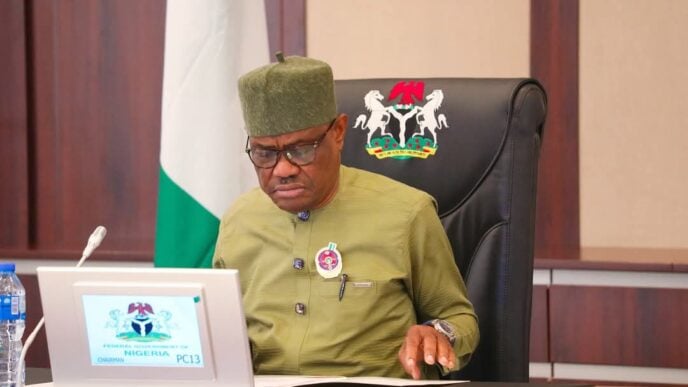Voice of women conference | File photo
BY OCHUKO PISERCHIA
Africa is on the verge of a digital trade revolution, yet the continent captures less than 1% of the global $4.25 trillion digital trade market. For Nigeria to claim its share, empowering women entrepreneurs must be a central economic strategy.
Across Africa, several initiatives demonstrate how targeted investment can unlock women’s
potential. The African Development Bank’s Affirmative Finance Action for Women in Africa
(AFAWA) uses risk-sharing mechanisms to mobilise over $5 billion for women entrepreneurs. Kenya and Ghana have benefited from targeted credit guarantees and mentorship programmes, increasing business sustainability and scale. In Nigeria, the Partnership Initiatives in the Niger Delta (PIND) has facilitated over 14,600 jobs in the Niger Delta by combining grants, capacity-building, and innovative finance – a proven model for catalytic investment.
The evidence is clear: when women earn, they reinvest up to 90% of their income into families
and communities, creating a multiplier effect that strengthens society. Yet structural barriers
persist. Only 16.7% of Nigerian women access formal credit, compared with 28% of men. A
Gates Foundation survey of 100,000 Nigerian women entrepreneurs found that 62% identified
lack of capital as their biggest obstacle to success.
Advertisement
Fortunately, we have seen what works. Kenya’s Women’s Enterprise Fund, a government-backed initiative, has supported tens of thousands of women-led businesses through low-interest loans and capacity-building, demonstrating how public financing can create sustainable entrepreneurship.
The SheTrades Initiative, led by the International Trade Centre (ITC), connects women entrepreneurs across multiple African countries to global markets. Over one million women have been reached globally, and in Africa, SheTrades has facilitated market access, digital skills training, and networking opportunities for women in Ghana, Kenya, and Rwanda. These examples underscore the critical role of digital platforms and structured support in overcoming market access barriers.
Global initiatives are also leading the way. The WTO’s Women Exporters in the Digital Economy (WEIDE) Fund provides capital and coaching to women entrepreneurs in developing countries, including 146 Nigerians selected. The IFC’s Women Entrepreneurs Opportunity Facility in East Africa leverages blended finance to support thousands of women-owned SMEs. These programs show that Special Purpose Vehicles (SPVs) and blended finance structures are effective tools to pool capital, de-risk investments, and scale women-led businesses in both digital and traditional sectors.
Advertisement
Nigeria now has the opportunity to replicate and expand these models. Dedicated SPVs for women’s digital trade can channel public, private, and donor resources efficiently, offering credit guarantees, technical support, and access to digital infrastructure. By reducing risk for financial institutions, attracting impact investors, and enabling growth for women entrepreneurs, these vehicles can transform Nigeria’s participation in global digital trade.
The Gates Foundation survey also highlights both immense ambition and persistent frustration. Nigerian women have the talent, ideas, and drive to succeed. But without targeted support, these opportunities remain out of reach. By combining structured financing, capacity-building, and digital integration, Nigeria can unlock the full economic potential of its women entrepreneurs.
Women’s economic empowerment is just about doing what feels good. It is an economic imperative backed by evidence–when women are supported with finance, training, and market
access, the impact multiplies across communities and economies. Mobilising capital through SPVs and risk-sharing mechanisms is a strategic pathway to inclusive growth and global
competitiveness, positioning Nigeria as a leader in African digital trade.
The digital economy is moving fast. The question is whether Nigeria will stand on the sidelines,
or whether it will invest decisively in women to claim its share of the future.
Advertisement
Ochuko Piserchia is a global advisor on impact invest ment . She drives operations at the Washington DC-based Niger Delta Partnerships Initiative (NDPI).
Views expressed by contributors are strictly personal and not of TheCable.











